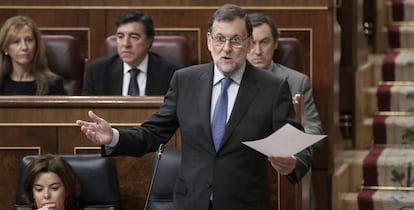New government and end to impasse not enough for Spanish voters
Latest poll reveals that seven out of 10 Spaniards describe political situation as “bad or very bad”
One month into his second consecutive term in office, albeit after 10 months heading an interim administration, Prime Minister Mariano Rajoy’s government has done little to impress Spaniards, with almost three-quarters of taxpayers saying the country’s political situation is bad or very bad. That’s according to the latest poll carried out by the Center for Sociological Research (CIS), and which was released on Monday.

The question was posed as part of a survey carried out in the first 11 days of November, in the run-up to the Popular Party (PP) leader’s investiture. At 74.3%, the result shows a slight improvement to the same question posed the month before, when 81.1% said they saw the political situation as bad or very bad.
Barely 4% of those surveyed thought the situation had improved with the end of the political deadlock that followed two inconclusive elections and the failure of the country’s four main parties to reach any kind of governing deal. Spain narrowly avoided a third election after the Socialist Party (PSOE) agreed to abstain at Rajoy’s investiture vote and emerging center-right group Ciudadanos cut a deal with the PP this summer to support it in Congress.
Opinion polls in recent years show a steady erosion of confidence in the country’s politicians
When asked to compare the current situation to a year ago, as the country faced its first election, 88.9% of Spaniards responded saying that the political situation is the same or worse. After unemployment and corruption, Spain’s politicians are seen as the country’s biggest problem.
In October, the first-ever anti-corruption commission met in a move opposition parties hope will restore the trust of the electorate in its political class. The historic initiative was set up with the backing of all Spain’s main parties except for the PP.
The conservative group has been tainted by a raft of scandals that have involved its members, including the Gürtel, Púnica, Bárcenas and Taula cases. Dozens of elected officials are being investigated or tried for crimes ranging from graft and patronage to illegal party financing.
Successive polls show that Spaniards blame politicians for the current state of affairs: 80% feel that the government is doing a poor job fighting corruption, according to a survey by Transparency International. No other EU state has such high disapproval ratings.
King Felipe highlighted corruption when he addressed Congress last month
What’s more, 55% of respondents to the October CIS poll said they believe that most of Spain’s Cabinet is involved in illegal activities. This was part of the reason why the PP had so much trouble finding allies to form a government. When Ciudadanos agreed to a deal this summer, one of its conditions included Rajoy signing a six-point anti-corruption pledge.
In his speech at the official opening of Congress last month, King Felipe highlighted the problem of graft. “Corruption,” he said, which has outraged public opinion throughout our country, must be fought with firmness, and has to become a sad memory of a scourge that we have beaten and overcome.”
Despite the widespread unpopularity of Spain’s politicians, 82.9% of those who took part in the CIS survey said they voted in the June 26 elections. Some 22.9% said they voted for the PP, with 21.4% supporting the PSOE, 12.4% Ciudadanos, and 19.4% Unidos Podemos, an alliance between the Communist Party-led United Left and the anti-austerity grouping Podemos.
Asked about the state of the Spanish economy, 63% of those surveyed said the situation was bad or very bad, with just 4.4% describing it as positive or very positive. Almost half of those surveyed said their personal finances were average, with 31.2% saying good or very good and 18.6% bad or very bad. The CIS survey shows that 30% of Spaniards live in a household where the net monthly income is less than €1,200.
English version by Nick Lyne.
Tu suscripción se está usando en otro dispositivo
¿Quieres añadir otro usuario a tu suscripción?
Si continúas leyendo en este dispositivo, no se podrá leer en el otro.
FlechaTu suscripción se está usando en otro dispositivo y solo puedes acceder a EL PAÍS desde un dispositivo a la vez.
Si quieres compartir tu cuenta, cambia tu suscripción a la modalidad Premium, así podrás añadir otro usuario. Cada uno accederá con su propia cuenta de email, lo que os permitirá personalizar vuestra experiencia en EL PAÍS.
¿Tienes una suscripción de empresa? Accede aquí para contratar más cuentas.
En el caso de no saber quién está usando tu cuenta, te recomendamos cambiar tu contraseña aquí.
Si decides continuar compartiendo tu cuenta, este mensaje se mostrará en tu dispositivo y en el de la otra persona que está usando tu cuenta de forma indefinida, afectando a tu experiencia de lectura. Puedes consultar aquí los términos y condiciones de la suscripción digital.









































